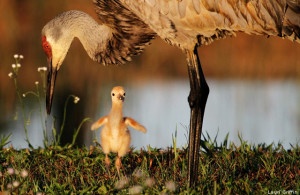We have much more to do and your continued support is needed now more than ever.
The Farm Bill Expires Today, and So Do Wildlife Protections

Farm Bills are typically written in five year increments, and one the bill expires, farm law reverts back to something called “permanent law,” which refers to laws passed in the 1930s and 40s. Because this permanent law is so outdated, it is virtually unheard of for Congress to allow the Farm Bill to expire and these outdated laws to kick in—until last year, when that was exactly what happened. Now, we are facing a Farm Bill lapse for the second year in a row.
Although the major crop insurance, commodity support, and nutrition programs in the Farm Bill won’t be immediately affected under an expired Farm Bill, there will be immediate consequences for many conservation programs. While working lands programs such as the Conservation Stewardship Program and the Environmental Quality Incentives Program don’t expire until 2014, most of the land retirement programs have an expiration date of September 30, 2013—today. This means that until a new Farm Bill or an extension is passed, as of tomorrow USDA will be unable to enter into any new contracts for the Conservation Reserve Program, the Grassland Reserve Program, the Wetlands Reserve Program, and the Chesapeake Bay Watershed Program. These programs provide critical benefits for soil and water quality and help to create and conserve habitat for wildlife. They are popular with landowners and have a proven record of effectiveness.
In addition to these programs being frozen, allowing the Farm Bill to expire and delaying the passage of a new five year Farm Bill delays the implementation of critical reforms such as a sodsaver provision to protect native prairies and a provision that would tie conservation compliance to crop insurance in order to protect soil and wetlands. Earlier this month, the USDA released shocking data showing that hundreds of thousands of acres of grasslands and forests were destroyed last year alone to make way for cropland – we can’t afford to wait any longer before we move forward with these protections (both of which are included in the Senate version of the Farm Bill).
For a full explanation of implications of the farm bill expiration, see this very helpful report from the Congressional Research Service.
![]() Speak up today, and help protect habitat for Northern Pintail ducklings and other wildlife.
Speak up today, and help protect habitat for Northern Pintail ducklings and other wildlife.





















